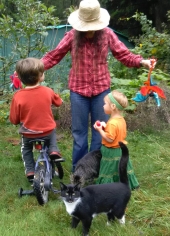posted 8 years ago
I don't understand the question. You say you won't be farming for the income, yet you (essentially) ask what our collective advice is for earning a farming income.
Regardless, it is my contention that farming cannot be truly "business-ified." (I just made that up, in case it's not clear.) A good farm and a business operate in different spheres. Those spheres may touch, but they don't overlap.
When a farm starts making business decisions that are solely business decisions, I would argue that the farm suffers as a result, because such decisions are based not on what the farm needs but on what the business needs (or wants). Sometimes they both need the same thing, and that is certainly a happy occasion, but too often they are at odds.
Farmers (that I have seen) who start making decisions based on what sells tend to work themselves out of a business. Mostly this is because they realize that they don't really like what they're doing, or at least that they don't like doing it at that scale. They realize, in short, that what they are doing is a form of prostitution. The motivations for farming and business ownership are different.
But the farmers who do what they love tend to do just fine. And maybe that happens with no significant farming income. They might hold an off-farm job, or have a spouse that does, but they stick with the farming because they love it, and they do it well. The ones who succeed at both the farming and the business tend to do so because they focus on the farm first and foremost, and perhaps figure out how to sell what it is that they and their farm produce. In short, they don't go producing for a market, they find a market for their production.
I'll use myself as an example. There are two local restaurants that would buy ducks from us, year-round, at the rate of upwards of 20 ducks per week total. This could be a very significant part of our needed income. Last year and this year, we tried to meet a portion of that demand. And we learned two important lessons. One, we can't raise ducks in a southern Missouri summer and have them reach marketable weight. It's just too hot, and they don't eat enough to get big enough quickly enough. Two, and more importantly, we learned that we don't want to raise that many ducks. Our goal is not to be "the duck farmers" in southwest Missouri, but to have a good, healthy, balanced farm. We realized that raising more than about 200 ducks per year is just too many, and pushes us too far in that one direction. This leaves less time for other things we want to do, and adds a particularly unpleasant level of stress when this big thing you're counting on doesn't work out. So, instead, we sell ducks to a couple of small restaurants, whose needs are relatively small and whose menus change frequently, allows us to match production and timing/seasonality to sales; the rest are sold direct to individuals.
So, yeah, do what you love. If you don't know what that is yet (and you probably can't know until you've tried), try a little bit of as many things as you can and figure out what you love, what you're skilled at, what motivates you, and what you like the idea of but not the actuality.
Another bit of good advice (via Joel Salatin) is to raise what you eat. If you don't eat it, odds are good that others don't either (thus, few sales). And if you don't eat it, what are you going to do if you can't sell it? You can't eat it, because you don't eat it! I'll take Joel's recommendation a step further and apply it to diversity: if you don't eat only hydroponic lettuce, for example, don't grow only hydroponic lettuce.
Lastly, don't chase trends. This is both a philosophical and practical piece of advice. The philosophical probably speaks for itself. As for the practical--let's say the undoubted up-and-coming hottest farm item is the pink-and-green vertically striped beet grown entirely in vermicompost in a raised bed flanked by catalpa logs. By the time you fine-tune your system to the point that you're cranking out those suckers in all their preppy perfection, so have plenty of others. But even if you can weasel your way into the marketplace to sell the things, you'll discover that the "market" has moved on. That's the nature of trends. And that's the folly of chasing them.
So, yeah, do what you love.










 2
2








 1
1












